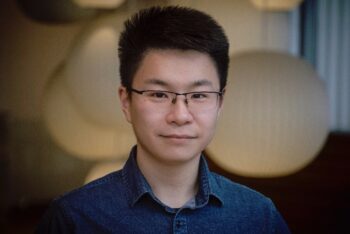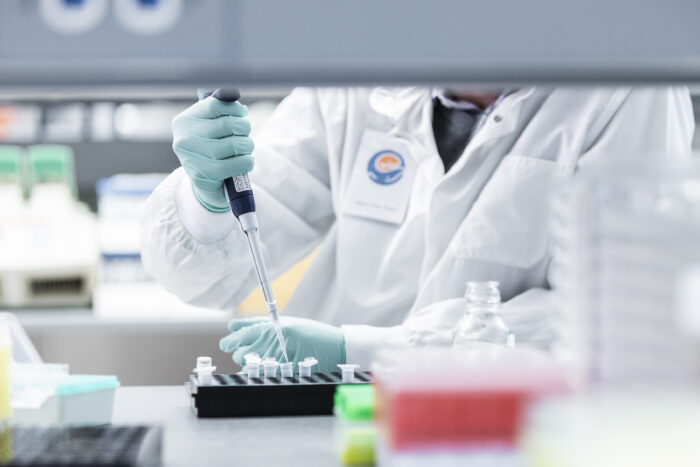Spotlight on Invent@SC’s Future Biotech Leaders: Meet Seattle Children’s Dr. Edward Song
7.27.2023 | Casey Egan
 Founded in 2022, the Invent at Seattle Children’s Postdoctoral Scholars Program is a first-in-the-nation postdoctoral training program that aspires to develop novel therapeutics at Seattle Children’s.
Founded in 2022, the Invent at Seattle Children’s Postdoctoral Scholars Program is a first-in-the-nation postdoctoral training program that aspires to develop novel therapeutics at Seattle Children’s.
The program is an investment in training talented early career scientists historically underrepresented in biotech in the development of therapeutics for childhood diseases.
It seeks to improve the lives of pediatric patients while educating the next generation of scientists in therapeutic discovery. Few therapeutics are developed specifically for children, yet “hand-me-down” drugs often fail to address pediatric diseases.
The program was created in partnership with Benaroya Research Institute, Fred Hutchinson Cancer Center and the University of Washington. Now a year in, the program is growing quickly with many scholars now having a chance to dive deep into the initial stages of research projects.
Dr. Edward Song joined the program in January and spoke with On the Pulse about what drew him to the program, his current research project, why it was a unique career opportunity, and what he hopes to accomplish during his time in the program.
How did you learn about the Invent@SC program?
Dr. Song: When I was looking for a postdoc position in Seattle, Dr. Shannon Oda at Seattle Children’s Research Institute mentioned the Invent@SC program to me during our meetings. I looked it up online and inquired about the program via its website, and Dr. Jim Olson, the director of the Invent@SC program, was very kind and spared his time to meet with me online to answer my questions about the program.
What made you decide to join the Invent@SC program?
Dr. Song: The Invent@SC program is a rare opportunity for postdoc candidates, as it provides resources to equip its postdoctoral scholars with knowledge and networks to become future leaders in the biotech industry. My passion has always been in translational research that could potentially become a clinical product to help patients, which aligns with the goal of the Invent@SC program.
In addition, the Invent@SC program feels like a family to me: from the directors, Drs. Jim Olson and Amanda Jones, to the program manager, Jane Koh, and to all the other Invent@SC scholars, everyone has been very friendly and supportive.
What makes the Invent@SC program different from other career moves you were considering after the completion of your PhD?
Dr. Song: As an Invent@SC scholar, we are not only supported by the lab where we can do our research, but also provided with lots of resources from the Invent@SC program for our career development. For example, other than our lab mentor, we can choose our biotech mentor and clinical mentor through the program.
The program also organizes or invites us to many events where we can socialize with local research and biotech leaders, as well as investors and sponsors. Each of us also has a professional development fund that we can use to take in-person and online courses to acquire more knowledge about the process of commercializing new biotechnologies.
Those are all amazing opportunities for our career advancement. Moreover, the Invent@SC program gives us an additional community and support system, and we often enjoy food and recreational activities together. While I’m writing this, the program is taking us to go on an Argosy Cruise tour this afternoon!

The Invent at Seattle Children’s Postdoctoral Scholars Program is a first-in-the nation postdoctoral training program that aspires to develop novel therapeutics at Seattle Children’s
What are you working on right now?
Dr. Song: My research project in the lab of Dr. Nicholas Vitanza is to develop and improve a new type of cellular therapy to treat pediatric brain cancers, namely chimeric antigen receptor (CAR) T cell therapy, in which we genetically modify patients’ own immune cells so that they can directly recognize and kill cancer cells.
CAR T cell therapies have been very effective treating blood cancers, so we are trying to take this new technology to treat brain cancers in children that have high fatality rates.
Specifically my work is focused on improving the CAR T cells with additional gene modifications so that they can easily locate and travel to the tumors in the brain. We hope this new iteration of CAR T cell technology will be more effective and bring cures to children with brain tumors.
What do you hope to accomplish in the Invent@SC program?
Dr. Song: When I was a PhD student, even though I was enthusiastic about doing translational research, the idea of founding my own company to develop clinical products for patients seemed very remote, because while I saw biotech companies spinout of my previous research institute (including two by my PhD mentor), almost all of them were co-founded by principal investigators, hardly involving a PhD student or postdoc.
However, now with the resources and opportunities that the Invent@SC program is giving us, my aim is to prepare myself to start my own biotech company in the future to bring the technologies I develop in lab to the clinic (of course it will depend on how my research project goes).